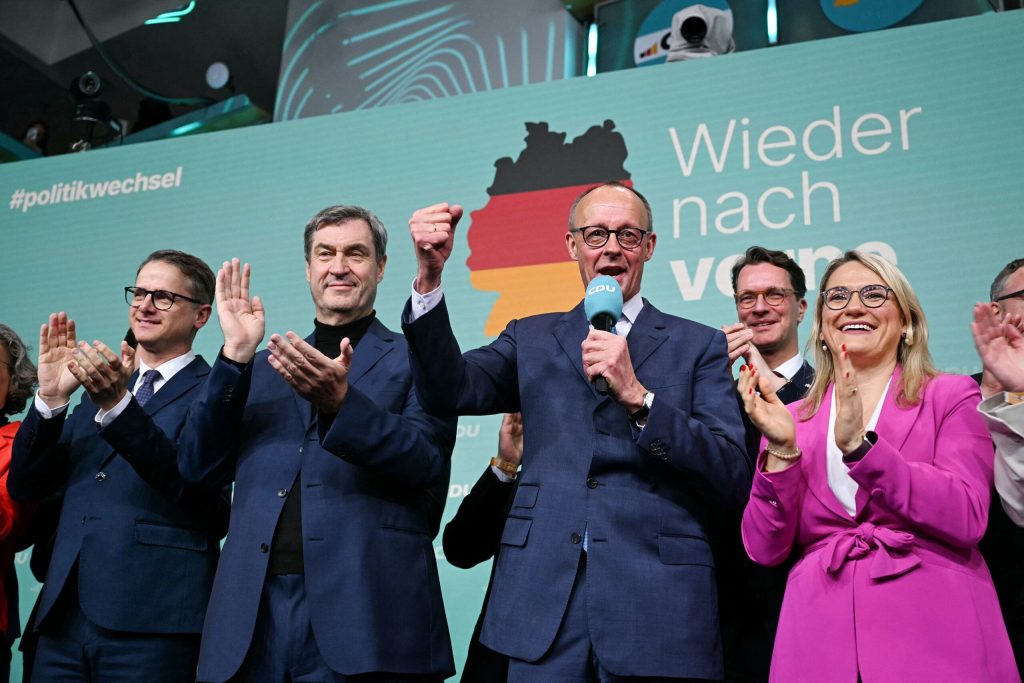Merz Aims for Europe’s Independence After Election Win

Friedrich Merz, who is set to become Germany’s next chancellor after his conservative party’s victory in Sunday’s election, has pledged to work towards securing “true independence” for Europe from the United States while forming a new government. At 69, Merz faces complex coalition negotiations after the far-right Alternative for Germany (AfD) surged to a historic second-place finish in a fragmented vote following the collapse of Chancellor Olaf Scholz’s unpopular three-party alliance. Mainstream parties have ruled out collaborating with the AfD, which has received support from high-profile U.S. figures, including tech mogul Elon Musk, a backer of President Donald Trump.
Merz, who has never held political office before, is about to take charge of Europe’s largest economy, which is grappling with divisions over migration and security challenges from both the U.S. and assertive powers like Russia and China. Following his victory, Merz sharply criticized the U.S., calling certain remarks from Washington during the campaign “outrageous” and comparing them to hostile actions from Russia. “We face enormous pressure from two sides, and my main goal now is to unify Europe,” he stated during a discussion with other leaders.
Although President Trump praised the election outcome, Merz’s comments about the U.S. were a departure from his previous pro-Atlantic stance. Merz argued that Trump’s administration had shown little interest in Europe’s future. “My top priority will be to strengthen Europe as quickly as possible so that we can achieve true independence from the U.S. step by step,” he added. He even questioned whether NATO, the alliance that has supported Europe’s security for decades, would continue to exist in its current form.
The CDU/CSU bloc led by Merz won 28.5% of the vote, while the AfD came in second with 20.5%, a record-high result. The AfD, aiming to form a government, expressed confidence in future success. However, Merz faces challenges in forming a coalition as his party achieved its second-worst post-war result. It is unclear whether he will need one or two partners to secure a majority, and the positions of smaller parties could complicate coalition negotiations. A new three-party alliance might be difficult to manage, hindering Germany’s ability to lead effectively.
Scholz’s Social Democrats (SPD) suffered their worst result since World War II, with just 16.5% of the vote, while the Greens earned 11.8%. The far-left Die Linke party gained 8.7% of the vote, bolstered by strong support from younger voters. The Free Democrats (FDP) and the new Sahra Wagenknecht Alliance (BSW) were both close to the 5% threshold needed to enter parliament.
Experts warn that a three-party coalition could lead to stagnation unless the parties involved realize the urgency of change, especially to prevent the AfD from gaining further ground. Without significant reforms, foreign investment could be deterred, further weakening Germany’s economic prospects. Voter turnout was 83%, the highest since before reunification, with male voters leaning towards right-wing parties and female voters showing stronger support for left-wing options.
Merz, a strong economic liberal who has shifted the conservatives further right, is considered the opposite of former Chancellor Angela Merkel, who led Germany for 16 years. Merz has supported providing Ukraine with longer-range Taurus missiles, a measure the Scholz government had avoided, and views Europe’s future as firmly tied to NATO.
The election follows the collapse of Scholz’s coalition in November, after disagreements over budgetary issues between his SPD, the Greens, and the FDP. Extended coalition talks could leave Scholz in a caretaker role for months, delaying crucial economic policies as Germany faces two years of economic contraction and increasing competition from global rivals. The delay could also create a leadership vacuum in Europe at a time when challenges such as trade tensions with Trump and the need for a ceasefire deal in Ukraine, excluding European involvement, are emerging.
